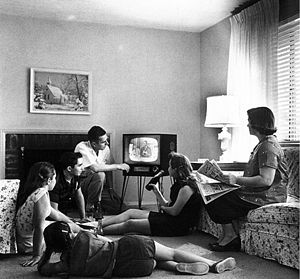
According to an article i read,the other day,Nollywood,a metanym for the Nigerian film industry,is responsible for the “death” of Nigerian television.The author seemed to suggest,that Nollywood not only turned people away from watching television,but it also lured away television’s “great” talents.He went on to list the producers and actors/actresses who gravitated towards Nollywood,away from television.The article got me thinking.Is it really true that Nollywood killed television?Is there not room enough for both?Does one have to survive at the expense of the other?
For me,there is enough room for both Nollywood and television to thrive.Television can thrive alongside Nollywood if it’s content,programs,were better.That it is not doing so,can be squarely ascribed to it’s vapid offerings.In the past,70s and 80s,most urbanites watched television,not because it’s programs were so great,with some exceptions,but because it was the only game in town.The Nigerian audience was captive:it had no options.Until the 90s,when the democratization of access to home entertainment,first in the shape of foreign videos and then later,Nollywood,gave Nigerians much needed options.
With the spread of video technology,bringing foreign movies into most people’s homes,television became something you could ignore,until the news at nine.Most people stopped watching television for entertainment.It was in response to this entertainment-vacuum,that Nollywood came into existence.Nollywood came to fill a need,that television could not meet.It is sheer nostalgia to talk about a “golden age” of Nigerian television.There never was a “golden age”.Yes,there was a time,when a captive audience,lacking options,and going by the standard of the day,thought much of Nigerian television.But that audience knows better,and is no longer captive,today.The audience is more sophisticated.So,too, should television be.
The sort of nostalgia on display in that write-up,where people unnecessarily idealize and romanticize the past,is dangerous.It is dangerous because,based on poor analysis,it can lead to poor policy-making.Before you know it,government will start talking about protecting television,by interfering,high-handedly, with somebody’s business.And television is too important,to be left to the ministrations of these “protectors”.Television provides entertainment,information and education.It brings,and helps keep,the family together,at least once a day.It mediates the governance process,by keeping people informed of government activities.And all this,for free.
Unlike cable broadcasting,generally subscription-based,television is defined by the fact that access to it’s broadcast is free.Funding comes from government subvention,where it is government-owned,or advertising.As vendors of news and entertainment,the media is defined by the ability to aggregate an audience.The better and more useful the content,the greater the audience.Access to this audience is then given to producers of goods and services,for a fee.Thus advertising,which enables producers of goods and services to showcase their offerings to the public,is key to the media being able to fulfill it’s role,as mediators of the consumption process.
For television to build,and keep,an audience,and benefit from advertising,programming must become attractive.This will cost money.More money than it can receive from the government,as subvention,where available.The money has to come from advertising.But advertisers will not pay good money,unless there is a sizable audience.And you cannot have a sizable audience,unless you have good programs.This is the vicious circle,in which Nigerian television finds itself.The main obstacle to decent television in this country,is poor power supply.For television to build a sizable following,would require round-the-clock viewership.This is not possible without round-the-clock power supply.Do not put the blame on Nollywood.



















